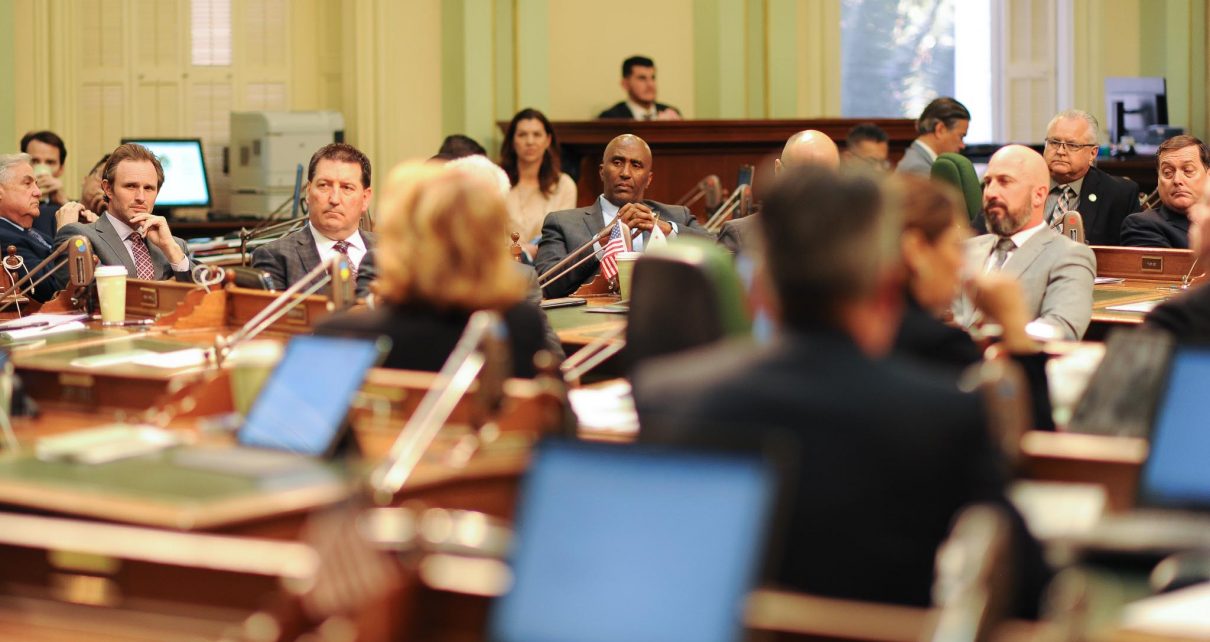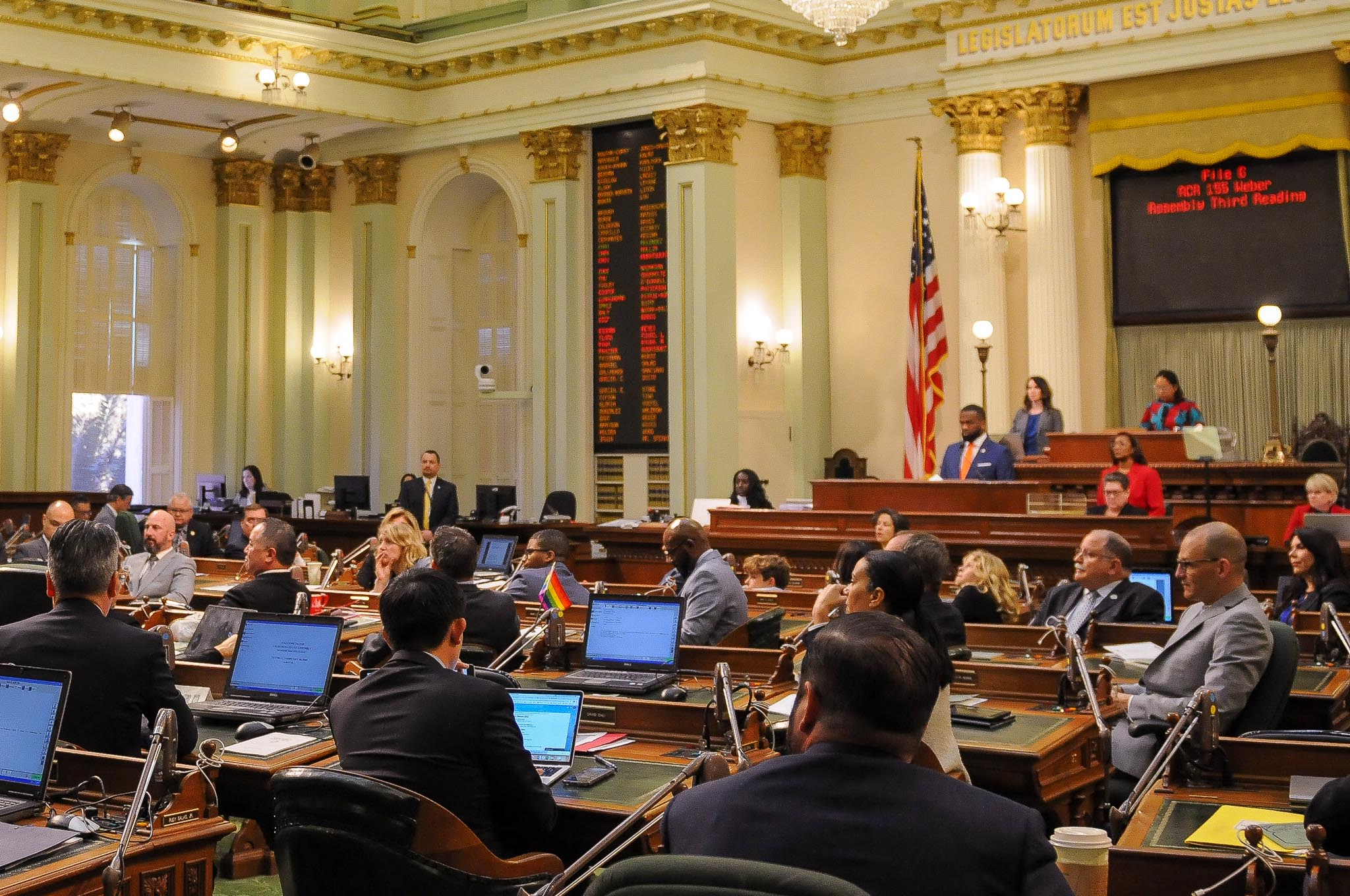
California State Assembly. (Photo: Kevin Sanders for California Globe)
Can a Legislator Re-introduce the Same Bill Next Year?
Are there any applicable rules?
By Chris Micheli, October 11, 2023 10:37 am
As we head into the second year of the 2-year California Legislative Session, some legislators may want to re-introduce a bill that did not make it to the Governor’s Desk during this first year. Are there any applicable rules?
The Joint Rules of the Assembly and Senate contain Joint Rule 54, which is titled “Introduction of Bills.” Subdivision (a) discusses the deadline for bill introductions and exemptions from that deadline. Subdivision (b) concerns when the Assembly and Senate Desk are open and what occurs after the printing of a bill.
Subdivision (c) gives us guidance on reintroduced bills. It states: “(c) Unless approved by the Committee on Rules of the house of origin, a Member may not author a bill during a session that would have substantially the same effect as a bill the Member previously introduced during that session.” JR 54(c) goes on to specify that “this restriction does not apply in cases where the previously introduced bill was vetoed by the Governor or its provisions were “chaptered out” by a later chaptered bill pursuant to Section 9605 of the Government Code.”
As a result of this language, a Senator or Assembly Member is prohibited from authoring a bill during the same 2-year session “that would have substantially the same effect” as a bill that legislator “previously introduced during that session.” While JR 54(c) does not define the phrase “substantially the same effect,” the main limitation set forth is the bill that was previously introduced during that same session.
In other words, unless approved by the respective Rules Committee, or an exemption applies, the Senator or Assembly Member cannot re-introduce the same “introduced” version previously introduced earlier in that same session. It would appear that JR 54(c) only applies to the introduced version of the bill and that has been the “custom and practice” of the State Senate and State Assembly. So, for example, they could introduce a bill that had been amended one or more times.
Nonetheless, the first obvious exemption to JR 54(c)’s prohibited reintroduction can occur if the Assembly Committee on Rules approves it for an Assembly Bill, or the Senate Committee on Rules grants approval for a Senate Bill.
The second and third exemptions to the prohibition are a for a bill that was vetoed by the Governor in the first year of session, or when a bill’s provisions were “chaptered out” by a later chaptered bill. As a result, the same bill can be reintroduced by the same legislator if the bill never became law because of a veto or a “chaptering out” problem.
Lastly, if a bill were re-introduced and another legislator wanted to question whether there was a violation of Joint Rule 54(c), “an objection based on this restriction may be raised only while the bill is being considered by the house in which it is introduced. Upon objection, the chairperson of a committee, if the objection is raised in a committee hearing, or the presiding officer, if the objection is raised on the floor of the house, may rule on the objection to the bill.” Once the bill passed its house of origin, an objection could not be lodged in the second house.
Note that this objection to the bill may be referred to the Committee on Rules of the house in which the bill was introduced for a determination. The Committee on Rules of the Assembly or the Senate may obtain assistance from the Legislative Counsel as to the similarity of a bill or amendments to a prior bill.
- Renewal of Judgments - February 18, 2026
- Hearings on Third-party Claims - February 18, 2026
- Cullen Earthquake Act - February 17, 2026





Seems this would take care of Wiener’s SB 58 (legalize psychedelics), for one. If so, we have to wonder if he would make it substantially worse or substantially better?
@Showandtell: Probably not. Rule 54 says: “This restriction does not apply in cases where the previously introduced bill was vetoed by the Governor…” This is the case with SB-58, so it doesn’t apply. It passed both houses and Newsom vetoed it, and even wrote “I urge the legislature to send me legislation next year that includes therapeutic guidelines” in his veto message. Until the substances are rescheduled, doctors can’t prescribe them, and there’s no way to set up a legal market for them without involving the DEA. That would come with very expensive production and accounting requirements. Since the whole point of the exercise is low-cost access to medicines, Wiener’s next move could be to introduce a version that parallels the 1996 Compassionate Use Act or the 2016 Medical Cannabis Regulation and Safety Act. Persons with a “medical recommendation” would sign up to follow “therapeutic guidelines” and get a “mushroom card” that allows them to cultivate and consume psilocybin mushrooms.
Conceivably this could all be legislated and signed into law to take effect January 2025, the same date SB-58 reforms would have taken effect.